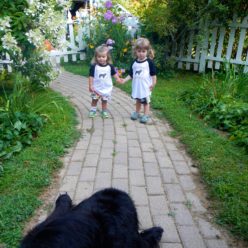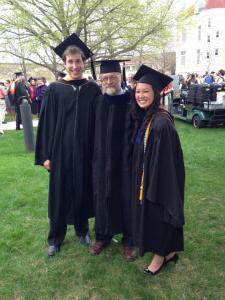Dear First-year Student,
I may not meet you for awhile since I am not teaching first-year courses as often as I used to. I do offer you a heartfelt welcome. You may well be the son or daughter or niece or nephew of one of my former students. That happens a lot.
First-year students have played a very important positive role in my life during my 36+ years of teaching here. You have made me smile, motivated me to learn from your enthusiasm, made me proud as I have seen you grow across your years here, and made me especially happy when we have been able to stay in touch across the years.
You sometimes have been favorably referred to as “the App Generation.” Don’t forget that your best apps are your values and your mind. You, the Class of 2018, do have very different life experiences than I. I look forward to learning from you and with you—if not directly this year, then in subsequent years. Do drop by and say hello in the interim.
Here are a few friendly suggestions I offer based on my years of teaching and learning.
- Don’t be too proud to seek help or advice from faculty, staff, administrators, and older students here—especially those who know the campus and our students well.
- Take advantage of opportunities to try new things, to meet new people (especially from different cultures) and to learn how to learn better. Let us become a global choir of learning.
- Research suggests that the quality of relationships (e.g. with peers, with faculty) is central to a positive, successful college experience.
- Set aside some time for self-reflection.
- Let self-discipline enable you rather than imprison you, find the right balance between service and involuntary servitude, between doing a right thing and doing things right. My own freshman year at Oberlin College in 1967 was informative and formative, lonely and elating, value challenging and values affirming. I envy you the learning opportunities that are here.


 My thoughts may be even fuzzier this Saturday morning as I sit here in my office—a little over 24 hours before your Commencement Day. I have just returned from a three hour meeting in my role of Faculty Observer at a Board of Trustees Meeting, and I was most impressed by the poise, courage, compassion, and intelligence of the remarks made by your Student Senate President. Now is a good time to gather together some last thoughts about and for you. Tomorrow will be a joyful and tearful day as relationships change. Because of my
My thoughts may be even fuzzier this Saturday morning as I sit here in my office—a little over 24 hours before your Commencement Day. I have just returned from a three hour meeting in my role of Faculty Observer at a Board of Trustees Meeting, and I was most impressed by the poise, courage, compassion, and intelligence of the remarks made by your Student Senate President. Now is a good time to gather together some last thoughts about and for you. Tomorrow will be a joyful and tearful day as relationships change. Because of my